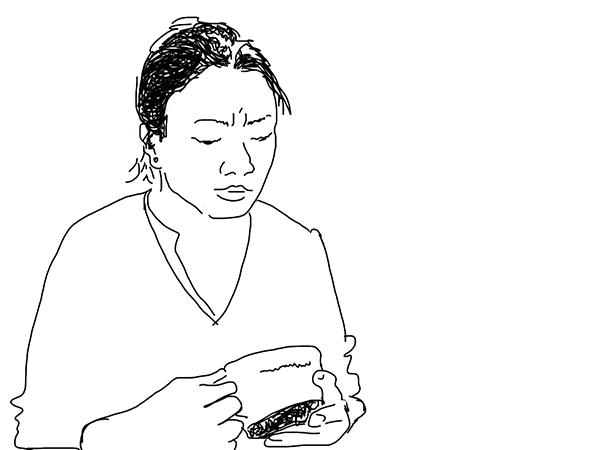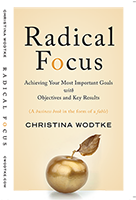tl;dr If you knew having a woman’s name would sink your sales, would you use a pen name?
Writing a book is hard. Not because writing is hard work. It is. But lots of things are hard work. Figuring out why a SQL query broke is hard work. Figuring out why your bread won’t rise is hard work. Sorting out a bicycle chain that keeps popping off is hard work (and messy.)
Writing is hard because you put yourself into it. It’s becomes a bit of you on paper. And sometimes you get your values challenged, especially if you are worried about sales. Writing Radical Focus shook me up more than once.
When I wrote the first draft, I made the decision to make my lead character a woman and a person of color. I felt confident; Five Dysfunction of a Team has a female CEO as the protagonist and it was a bestseller. Radical Focus’s protagonist was modeled closely on a couple students of mine, and I thought I could represent a first-generation-Chinese woman’s experience accurately. As well, my students are sharp and sassy — they’d set me straight if I got it wrong.

I wasn’t writing a book about equal rights, but about startup struggles. Still, I wanted a protagonist who just happened to be a woman and Asian. I know that the more often people see women and people of color in roles of leadership, the more normal it becomes, and the easier it is for young people to imagine themselves in those roles. I teach those young people, and I want them to succeed.
But as I read more of my “competitor’s” book, I began to wonder. The Phoenix Project, The Goal, and the rest of Lencioni’s books have male protagonists. I suddenly recalled something I had heard in a Children’s Books writing workshop, “Publishers believe that girls will read books with boy protagonists, but boys won’t read books with girl protagonists. Don’t make your protagonist a girl. ”
Should I change my protagonist? Will it effect my sales?
I swear it was my moral fiber and not the nightmarish chore of rereading the entire damn book again and replacing all the references to Hanna’s race and sex that led me to stick to my guns.
I swear.

Then, I received the first draft of my cover design, just as I was reading the biography of James Tiptree Jr. A.K.A. Alice Sheldon.
This book blew my mind. Alice Sheldon spent her life struggling to play the role of a woman in a time when it meant cooking, cleaning and raising babies. She wasn’t very good at it, and left her husband, safari’d in Africa, had love affairs with men and women, fought in WWII, and joined the CIA. Then later in life (my age, actually) she started writing stories full of bravado and swagger under a man’s name, party because scifi was such a guys club. And partly because she felt she couldn’t write with her own voice, shackled by the idea of what a woman writer is. Alice had to be polite and helpful. James could be brave and transgressive.
And there is my cover, with Christina Wodtke blazoned across it.

But that was then, right? Before the 70’s and women’s rights.
2015: Writing under a male name makes you 8x more likely to get published. Catherine Nichols didn’t change anything about her novel when she resubmitted it to agents except the byline. She choose a male name. (the entire story is worth reading)
2014: Jodi Picoult — who wrote 23 novels in 22 years, eight of which have been number one on the New York Times bestseller list — struggles to be taken seriously:
“I write women’s fiction,” she says, an ‘apparently’ hanging in the air. “And women’s fiction doesn’t mean that’s your audience. Unfortunately, it means you have lady parts.”
J.K. Rowling was worried male readers wouldn’t pick up a book about wizard knowing it was written by a woman.
and then there’s James Chartrand. Who is a woman who decided to try out a male pseudonym:
“Instantly, jobs became easier to get.
There was no haggling. There were compliments, there was respect. Clients hired me quickly, and when they received their work, they liked it just as quickly. There were fewer requests for revisions — often none at all.”
So in order to make a living and feed her kids, she choose to give up her name and be James. And she still would be the “male” founder of Men with Pen’s if a spiteful ex-friend hadn’t chosen to out her.
So what am I to do? Will anyone buy a business book by someone named Christina? Maybe if it was about HR or feelings or being an introvert, then it’d be ok if I am a woman. But my book is about focus and velocity and execution. Guy stuff, right?
I worry what people think when they see my byline.
Shall I try C.R. Wodtke, initials with no music to them? Or Chris Wodtke, the nickname I detest? Or Carl, the name I’d have been given if I was born a boy? Should I become a man?
I like being Christina Wodtke. So I went for it. It’s a good book. I worked my butt off on it, and I’ve got all 5-star reviews. I choose to be me.
But today, March 6th, 2016, only two of the top ten bestselling books in my category on Amazon, Leadership and Management, are written by women. (If the bylines are to be trusted.) And only two of ten on the venerable New York Times Bestseller List.
Each day, I wonder what my sales would be if I was Chris.
More on how unconscious bias works, and why you have it.